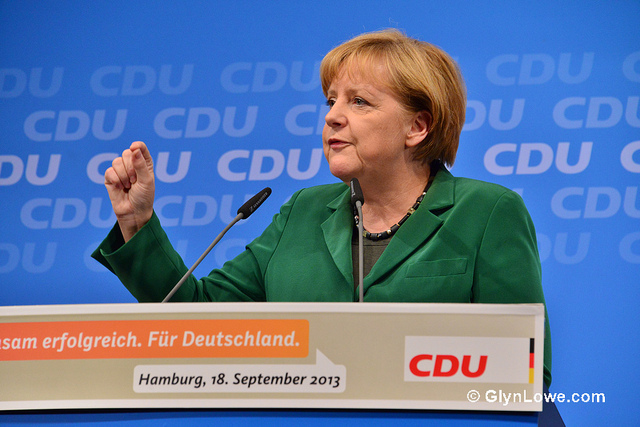Given the pivotal importance of Germany in shaping the future CAP, it is worth paying attention to what the CDU/CSU coalition have to say about agriculture in its just announced programme for government for the German elections in September. Not least because opinion polls currently suggest that Merkel will succeed in her bid for re-election. Among other issues, there are commitments to maintain direct payments after 2020 (though no commitment to seek any particular size of the CAP budget), to maintain the two-pillar structure of the CAP, to improve the crisis instruments at the disposal of the Commission and a preference to compensate for biodiversity loss arising from agricultural production through financial compensation rather than land set-aside (though how this might work in practice is not spelled out). Below is my rough translation of the agricultural section of the CDU/CSU programme for government.
Agriculture has a future
Agriculture, forestry and the food industry in Germany contribute greatly to economic activity, but also to the quality of life, culture and landscape management. These sectors provide valuable and modern jobs, training and apprenticeships particularly in rural areas.
CDU and CSU have always been the party of agriculture and forestry. We value In particular the modern family-oriented agriculture and the diversity of family businesses. We want to promote and preserve them. Agriculture must have a future in Germany. Our mission statement is a diverse, sustainable, competitive, land-based and land-covering agriculture in the hands of family farms.
We stand for the preservation of creation. Therefore, we reject cloning from animals. We want a partnership between agriculture and society and therefore promote this dialogue. CDU and CSU stand for the protection of property. A widely dispersed property is the foundation of agricultural and forestry production in farmers’ hands. We stand for maintaining a separate ministry for agriculture and the food industry.
• The EU’s Common Agricultural Policy (CAP) is a very high priority for us. We stand for continuity in the Common Agricultural Policy and for maintaining the 2-pillar model. We also stand for the continuation of direct payments after 2020. CDU and CSU are the reliable partner for farmers. We will pay attention to agricultural structure objectives and support particularly active farmers, young farmers and small and medium-sized enterprises.
• We want farms to have more time for their crop and livestock operations. That’s why we will reduce the bureaucratic burden for administration and operations. We need more exemptions for small businesses and must prevent multiple checks.
• We will launch an innovation fund for farmers. We want to accelerate technical, biological and digital progress such as precision agriculture through agricultural research and innovation. This will help us to make a further contribution to resource and climate protection. For this reason, an equal expansion of the digital infrastructure in the rural space is important.
• Conventional and organic farming for us are not In opposition and both will be encouraged.
• Through a livestock management strategy, which takes greater account of animal welfare, we want to create a greater social acceptance and to promote investment and planning security for enterprises. Agriculture and animal welfare are not opposites, but condition each other. Further improvements in animal protection we see as a cross – border challenge and we will strive for uniform standards in the EU. For CDU and CSU animal protection is an important concern, because animals are our fellow creatures.
• The introduction of a new official animal welfare label can help to increase animal welfare and to improve the market opportunities of the holdings concerned. Further development in animal protection must be practicable.
• Species protection is important and indispensable. To prevent misguided policies the protection status of animals and plants should be regularly reviewed in the light of their population development and, if necessary, adapted.
• Land is the basis of production for our farmers. We want to curb the consumption of land and will therefore reform and simplify the compensatory area system. We want that interventions in nature, wherever appropriate, should be compensated not by additional land set-aside but by financial compensation. The resulting revenue should then be used to achieve ecological concerns in other ways.
• The primary task of agriculture is food supply. We want to promote the appreciation of these high-quality domestic products through consumer education from childhood on. Therein lies a great potential to use food properly and to reduce waste.
• Market prices must be fair and producers should be enabled to have a decent income. We require a permanent risk equalization reserve so that farms can set aside an amount tax free in good years to draw down in years with lower income. Market and production risks should not be borne by the producer alone. We want a fair supply chain with market responsibility of both processors and the retail trade. At EU level, we are committed to an improvement of the crisis instruments.
• Particularly in relation to the exit of the United Kingdom from the EU we will take the concerns of the deep sea fishing industry especially into account.
• In the interests of sustainable wood and raw material management, we will strengthen and use the future potential of the forestry industry, while taking account of environmental and landscape protection concerns.
This post was written by Alan Matthews
Photo credit: Glyn Lowe, used by permission under a Creative Commons licence


